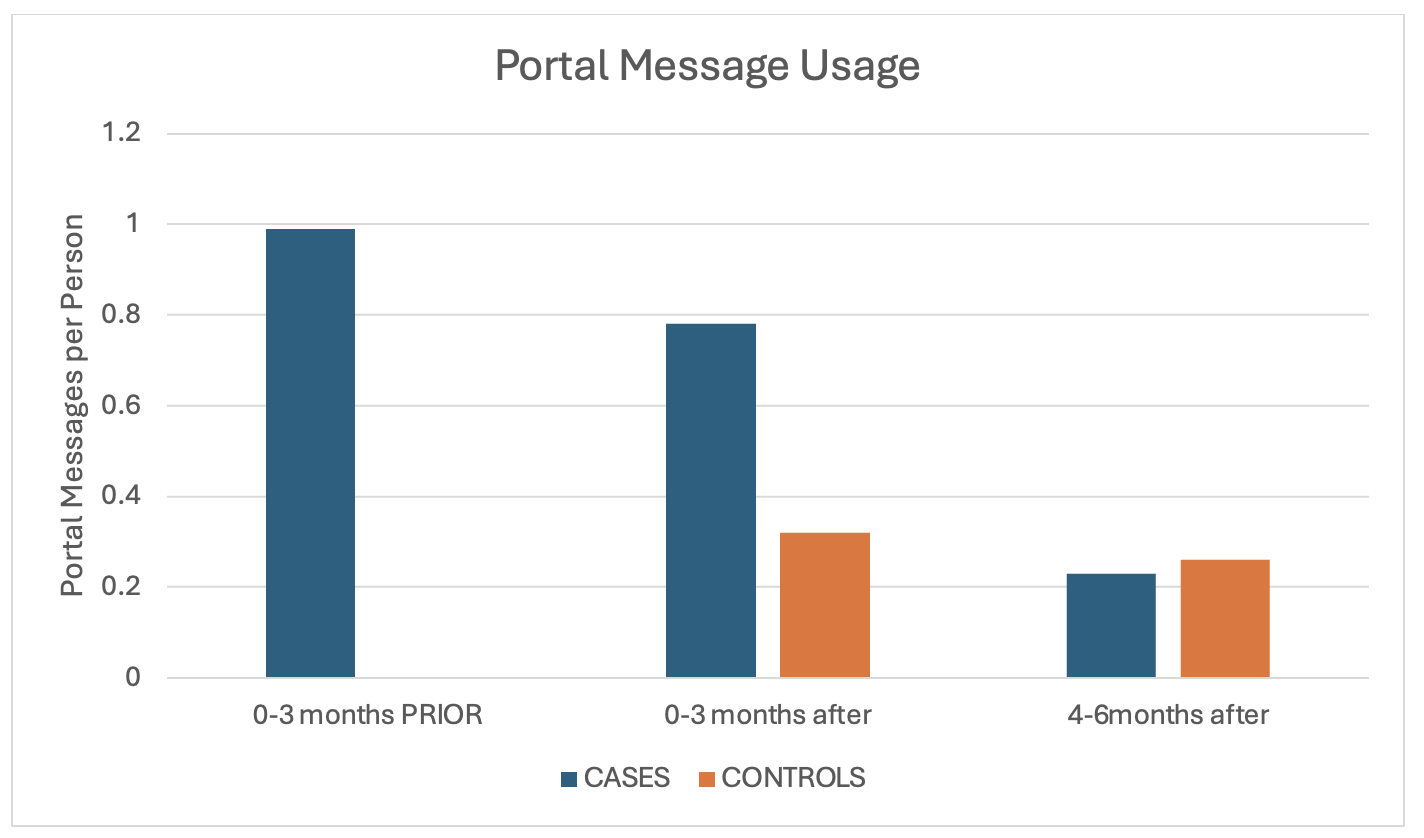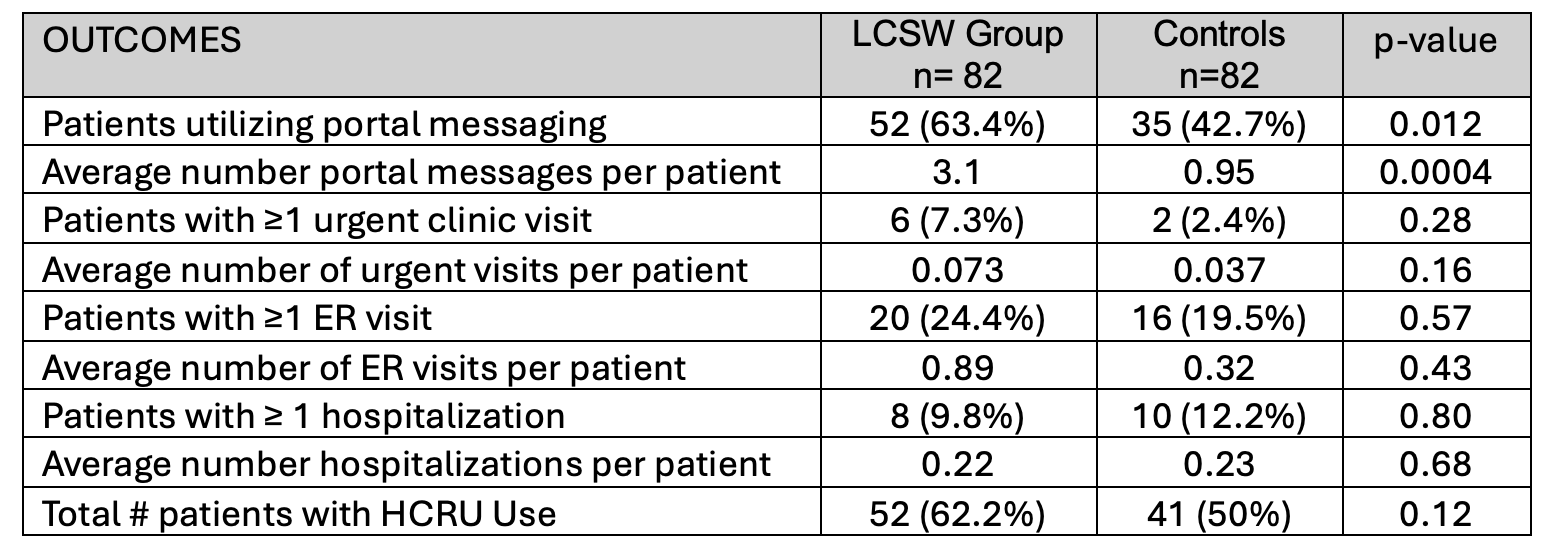Sunday Poster Session
Category: IBD
P1165 - Healthcare Resource Utilization in Patients With IBS and IBD After Licensed Clinical Social Worker Intervention
Sunday, October 26, 2025
3:30 PM - 7:00 PM PDT
Location: Exhibit Hall
- MA
Mohamad Abouelnaaj, MD
University of Texas at Austin Dell Medical School
Austin, TX
Presenting Author(s)
Mohamad Abouelnaaj, MD, Nikitha Gangasani, MD, Shrivani Mandaloju, MPH, Rima Shobar, MD, Emily Brooke, LCSW-S, Linda A. Feagins, MD
University of Texas at Austin Dell Medical School, Austin, TX
Introduction: Inflammatory bowel disease (IBD) and irritable bowel syndrome (IBS) are chronic illnesses that have significant impact on mental health. To address this, we have a Licensed Clinical Social Worker (LCSW) integrated in our academic gastroenterology practice. In patients with concomitant mood disorders, studies have shown an increase in healthcare resource utilization (HCRU). We postulate that incorporating care by a LCSW will reduce HCRU.
Methods: We performed a retrospective review of patients with IBD or IBS seen in our clinic between 1/1/2021 and 12/31/2023 with at least 6 months follow-up. We compared HCRU for those seen vs not seen by LCSW. HCRU was assessed by portal message usage, urgent clinic visits, ER visits, and hospitalizations in the 6 months after the baseline study visit. Cases and controls were matched 1:1 for disease type and age within 5 years.
Results: Of 164 patients, 82 saw the LCSW (cases) and 82 patients did not (controls). Demographics, proportion of patients with IBD and IBS, and burden of mood disorders were similar. In cases, 80% were recommended psychotherapy. PHQ-9 scores in cases dropped from 7 (out of 27) to 1.5 with a median of 2 LCSW visits per person after 6 months of follow-up. Notably, almost 30% of cases were already regularly seeing a mental health provider, compared to 5% in controls. The cases also had a higher proportion of advanced therapy use in IBD patients (42.6 vs 29.3%). Analysis revealed that patients with any HCRU was similar between groups (63% vs 50%, p=0.12). Assessed individually, portal message usage was significantly higher in the cases while urgent visits, ER visits, and hospitalizations were similar between groups (table 1). However, when portal message use in cases was compared pre- and post-LCSW intervention, the usage reduced substantially by 3 months (0.99 portal messages per person to 0.78, 21.2% reduction) and 6 months (0.99 to 0.23, 76.5% reduction). In the control group, portal message use was similar at 3 months (0.32 portal messages per person) and at 6 months (0.26) (figure 1).
Discussion: We did not find overall reduced HCRU within 6 months of LCSW intervention as compared to our controls without LCSW intervention. However, baseline use of portal messages was higher in our cases, probably due to higher mental health burden, and we saw a substantial decrease in portal message use to the level of the controls at 3 months after LCSW intervention along with stabilization of mental health evident by the decreased PHQ9.

Figure: Table 1: Healthcare Resource Utilization compared between patients seen by LCSW and controls who did not see LCSW within the subsequent 6 months.

Figure: Figure 1: Portal message usage in cases and controls before and after being seen by LCSW.
Disclosures:
Mohamad Abouelnaaj indicated no relevant financial relationships.
Nikitha Gangasani indicated no relevant financial relationships.
Shrivani Mandaloju indicated no relevant financial relationships.
Rima Shobar indicated no relevant financial relationships.
Emily Brooke indicated no relevant financial relationships.
Linda Feagins: Corevitas – Clinical trial participation. Takeda – Clinical trial participation.
Mohamad Abouelnaaj, MD, Nikitha Gangasani, MD, Shrivani Mandaloju, MPH, Rima Shobar, MD, Emily Brooke, LCSW-S, Linda A. Feagins, MD. P1165 - Healthcare Resource Utilization in Patients With IBS and IBD After Licensed Clinical Social Worker Intervention, ACG 2025 Annual Scientific Meeting Abstracts. Phoenix, AZ: American College of Gastroenterology.
University of Texas at Austin Dell Medical School, Austin, TX
Introduction: Inflammatory bowel disease (IBD) and irritable bowel syndrome (IBS) are chronic illnesses that have significant impact on mental health. To address this, we have a Licensed Clinical Social Worker (LCSW) integrated in our academic gastroenterology practice. In patients with concomitant mood disorders, studies have shown an increase in healthcare resource utilization (HCRU). We postulate that incorporating care by a LCSW will reduce HCRU.
Methods: We performed a retrospective review of patients with IBD or IBS seen in our clinic between 1/1/2021 and 12/31/2023 with at least 6 months follow-up. We compared HCRU for those seen vs not seen by LCSW. HCRU was assessed by portal message usage, urgent clinic visits, ER visits, and hospitalizations in the 6 months after the baseline study visit. Cases and controls were matched 1:1 for disease type and age within 5 years.
Results: Of 164 patients, 82 saw the LCSW (cases) and 82 patients did not (controls). Demographics, proportion of patients with IBD and IBS, and burden of mood disorders were similar. In cases, 80% were recommended psychotherapy. PHQ-9 scores in cases dropped from 7 (out of 27) to 1.5 with a median of 2 LCSW visits per person after 6 months of follow-up. Notably, almost 30% of cases were already regularly seeing a mental health provider, compared to 5% in controls. The cases also had a higher proportion of advanced therapy use in IBD patients (42.6 vs 29.3%). Analysis revealed that patients with any HCRU was similar between groups (63% vs 50%, p=0.12). Assessed individually, portal message usage was significantly higher in the cases while urgent visits, ER visits, and hospitalizations were similar between groups (table 1). However, when portal message use in cases was compared pre- and post-LCSW intervention, the usage reduced substantially by 3 months (0.99 portal messages per person to 0.78, 21.2% reduction) and 6 months (0.99 to 0.23, 76.5% reduction). In the control group, portal message use was similar at 3 months (0.32 portal messages per person) and at 6 months (0.26) (figure 1).
Discussion: We did not find overall reduced HCRU within 6 months of LCSW intervention as compared to our controls without LCSW intervention. However, baseline use of portal messages was higher in our cases, probably due to higher mental health burden, and we saw a substantial decrease in portal message use to the level of the controls at 3 months after LCSW intervention along with stabilization of mental health evident by the decreased PHQ9.

Figure: Table 1: Healthcare Resource Utilization compared between patients seen by LCSW and controls who did not see LCSW within the subsequent 6 months.

Figure: Figure 1: Portal message usage in cases and controls before and after being seen by LCSW.
Disclosures:
Mohamad Abouelnaaj indicated no relevant financial relationships.
Nikitha Gangasani indicated no relevant financial relationships.
Shrivani Mandaloju indicated no relevant financial relationships.
Rima Shobar indicated no relevant financial relationships.
Emily Brooke indicated no relevant financial relationships.
Linda Feagins: Corevitas – Clinical trial participation. Takeda – Clinical trial participation.
Mohamad Abouelnaaj, MD, Nikitha Gangasani, MD, Shrivani Mandaloju, MPH, Rima Shobar, MD, Emily Brooke, LCSW-S, Linda A. Feagins, MD. P1165 - Healthcare Resource Utilization in Patients With IBS and IBD After Licensed Clinical Social Worker Intervention, ACG 2025 Annual Scientific Meeting Abstracts. Phoenix, AZ: American College of Gastroenterology.
